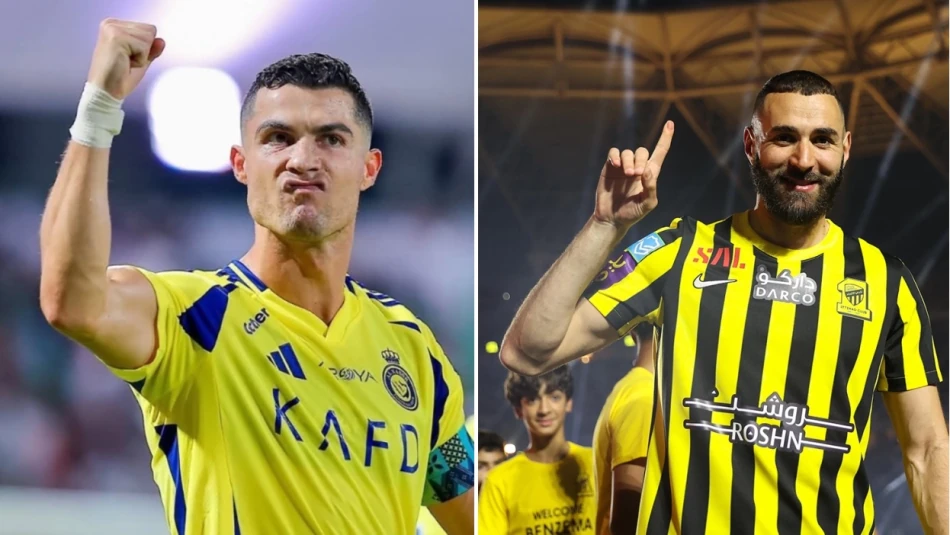
Ronaldo and Benzema Face Off in Thrilling Saudi Super Cup Clash
Saudi Super Cup Heads to Hong Kong as Al-Nassr and Al-Ittihad Battle for Domestic Supremacy
Saudi Arabia's premier football clubs are set to clash in Hong Kong for the 12th edition of the Saudi Super Cup, marking another strategic move to showcase the kingdom's rapidly evolving sports landscape on the global stage. The tournament, featuring Cristiano Ronaldo's Al-Nassr against defending league champions Al-Ittihad, represents more than just football—it's a continuation of Saudi Arabia's ambitious Vision 2030 sports diplomacy.
High-Stakes Semi-Final Showdown
Al-Nassr and Al-Ittihad will face off in Tuesday's first semi-final at 4:00 PM UAE time, in what promises to be a preview of this season's domestic title race. Al-Ittihad enters as the reigning Saudi Pro League and King's Cup double winners, while Al-Nassr arrives with significant reinforcements and renewed ambitions under new Portuguese coach Jorge Jesus.
The second semi-final pits Al-Qadisiyah against Al-Ahli, with the final scheduled for Saturday. Notably, Al-Qadisiyah is making their Super Cup debut, while Al-Ahli previously claimed the title in 2016.
Global Expansion Strategy Continues
This marks the fifth time the Saudi Super Cup has ventured beyond the kingdom's borders, following three previous editions in London and one in Abu Dhabi. The choice of Hong Kong signals Saudi football's intent to tap into Asian markets, particularly as the region becomes increasingly important for sports investment and fan engagement.
The international staging aligns with similar moves by European leagues and reflects the Saudi Pro League's broader globalization efforts since its high-profile player acquisitions began in 2023.
Tournament Legacy and Dominance
Al-Hilal leads the Super Cup honors with five titles, followed by Al-Nassr with two. Al-Fath, Al-Shabab, Al-Ahli, and Al-Ittihad have each claimed one title since the tournament's inception in 2013. Last year's final saw Al-Hilal demolish city rivals Al-Nassr 4-1, adding extra motivation for Ronaldo's side.
Star Power and Strategic Investments
Al-Nassr has made significant moves in the transfer market, securing Portuguese winger João Félix, Spanish defender Íñigo Martínez, and French winger Kingsley Coman alongside domestic talent Nader Al-Sharari. The appointment of Jorge Jesus, who previously coached rivals Al-Hilal, adds tactical intrigue to their campaign.
Al-Ittihad, led by French striker Karim Benzema, has maintained squad stability while making targeted domestic additions. The club retained coach Laurent Blanc after last season's double triumph and kept their core international players, including N'Golo Kanté, Moussa Diaby, Steven Bergwijn, and Fabinho.
Preparation and Form
Both clubs conducted extensive pre-season preparations across Europe. Al-Nassr's camp spanned Austria, Portugal, and Spain, yielding three wins from four friendlies. Al-Ittihad split their preparation between Spain and Portugal, struggling initially with four consecutive defeats before finding form in their final friendly.
Al-Ittihad will be without Serbian goalkeeper Predrag Rajković, who remains unavailable following surgery in June, potentially affecting their defensive stability.
Market Implications and Broader Context
The Hong Kong venue represents Saudi football's sophisticated approach to market expansion, targeting Asian audiences while maintaining the tournament's premium positioning. This strategy mirrors successful international expansions by La Liga and Serie A, though with the added dimension of state-backed sports diplomacy.
For investors and stakeholders in Saudi football, the international Super Cup serves as a valuable testing ground for global commercial appeal, particularly as the kingdom prepares for the 2034 World Cup hosting rights bid.
The tournament's outcome could significantly impact domestic league dynamics, with Al-Nassr seeking to establish early psychological dominance over their title rivals. Given the substantial investments in both squads, the Super Cup represents the first major test of whether Saudi football's spending spree is translating into competitive balance or continued dominance by established powers.
Most Viewed News

 Sara Khaled
Sara Khaled






